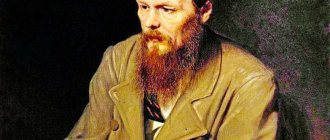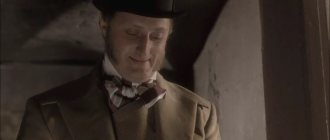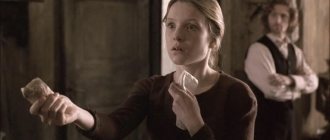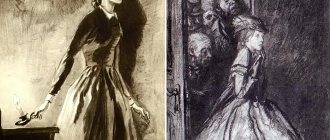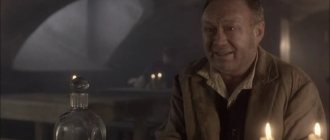Raskolnikov's path in the novel "Crime and Punishment"
The action unfolds in an extremely short period of time (within nine and a half days, not counting the epilogue, which tells about the events taking place a year and a half later).
The main character of the novel is Rodion Romanovich Raskolnikov, a former student at the Faculty of Law of St. Petersburg University. He has been in St. Petersburg for about three years, where he came from a provincial town where his mother and sister live. Father died. His mother and sister, denying themselves everything, regularly send him money so that he can study at the university.
Even as a child, Raskolnikov learned about the cruelty of the world and experienced acute compassion for the “humiliated and insulted.” Raskolnikov went to law school not because he wanted to become a lawyer, like Luzhin, but because he wanted to understand the problem of crime. His mother and sister do not understand him, thinking that he can work as Luzhin's assistant. And he left the university, most likely, not because he could not support himself. He is the author of the article “On Crime”. In the article he argued that a genius can sometimes, if necessary, commit a crime. Raskolnikov considered himself a genius. He will later “atone for his crime with a thousand good deeds.” Even then, after the crime, he does not find errors in his logical constructions and is angry that his nerves could not stand it.
His mother believes that he left the university because he could not support himself due to the fact that she stopped helping him and he lost his lessons. The last time she sent him money was four months ago. Two months ago, Raskolnikov learned about the humiliating position of his sister in the house of the landowner Svidrigailov, wrote to his mother about this, but received no answer.
A month and a half before the crime, Raskolnikov met the pawnbroker Alena Ivanovna, and took her sister’s ring as a pawn to her. During his first visit to the old woman, he developed a disgust for her. He decided that if he killed the old woman and robbed him, and then performed a thousand good deeds with her money, then it would be fair. His decision to kill the old woman had been ripening for more than a month, and after a letter to his mother, he realized that he could no longer hesitate. To save his sister from Luzhin, Raskolnikov finally decides to commit a crime. Raskolnikov long ago, even in his article, gave himself moral permission to commit this crime. He believed that he could do everything in cold blood, without leaving evidence, because the planned murder of a “malicious louse” that “eats someone else’s eyelid” is “not a crime.” He believes that “everything is in the hands of man.” Most of all, he is tormented by the question of whether he is capable of taking this step. He's been toying with this idea for a month now. He believes that for the sake of a happy future, a person can allow himself to “step over the blood.” The main idea of Raskolnikov’s article is “permission of blood according to conscience.” He calls his crime “a new step, a new word of his own.” In fact, Raskolnikov’s theory about the “right” of the strong, about two categories of people, and the convention of moral prohibitions was not a “new word.” Similar ideas were expressed by Max Stirner in his treatise “The One and His Property” (1844), in Napoleon III’s book “The History of Julius Caesar” (1865).
After a letter to his mother, he decided that he would rather sacrifice himself for the sake of his loved ones. But only later will he understand that they will not accept such a sacrifice.
Raskolnikov was terribly lonely even before the crime. The author depicts the tragedy of the hero's loneliness. Rodion has a deep conflict with the world, but his loved ones do not understand this. At the same time, Raskolnikov is not opposed to the society in which he lives. He absorbed its “poisons and beginnings.” His soul is a reflection of this world. That's why his soul is so sick.
The idea of killing the old woman grips Raskolnikov like a passion from which he is unable to free himself. Dostoevsky shows that a passion for crime, even something as terrible as murder, is deeply hidden in a person’s subconscious. This passion is everything: the desire to take revenge, restore justice, help yourself and your loved ones.
After the crime, Raskolnikov tries to live as if nothing had happened, but he fails, he is worried, his hands are shaking, he breaks down, gives himself away, is afraid that he will be arrested. On the other hand, he always wants to confess, to tell someone about his crime. In the police office, he suddenly wanted to confess to the quarterly supervisor Nikodim Fomich, who impressed him as a decent person. After visiting Luzhin, who reminded him of his senseless sacrifice, he goes out into the street in search of at least some way out. He enters the Crystal Palace tavern, where he meets Zametov from the police office and actually confesses to him the murder. The decision to go to the office and confess gradually becomes stronger. But at this time, the official Marmeladov, whom he met in a tavern before the crime, dies. Raskolnikov understands that Marmeladov’s family, especially his daughter Sonya, needs him, and decides to fight some more.
Then his mother and sister come to St. Petersburg. Svidrigailov arrives. Raskolnikov needs to continue to fight for himself, not to give up, because he needs to save Dunya from Luzhin and Svidrigailov. Therefore, he is fighting a real duel with investigator Porfiry Petrovich, who suspects Raskolnikov. In the end, Porfiry Petrovich invites him to turn himself in, otherwise he will arrest him. Raskolnikov has no choice, but even in hard labor he does not repent.
In Dostoevsky's novels, the plot is not the main thing. The fact that Raskolnikov killed the old woman and Lizaveta is not the main thing. The main thing is the questions that Dostoevsky poses. The question of the injustice of the world is, of course, the main one. The point is not that Raskolnikov killed. The point is that he had no other way out of his situation. But this is also not a solution. The point is not that Katerina Ivanovna sent Sonya to the panel. But the point is that there was no other way out. Crime is a search for an “exit” from a hopeless situation. But then, after the murder, it turns out that the world is not only a “vale of tears” and suffering, one can completely reconcile with it. After the crime, he begins to appreciate life and is ready to live “at the height of space.”
Another problem of the novel: is it possible to build a happy future if for this you need to kill a useless and harmful old woman? The officer and the student are talking about this in the tavern. Raskolnikov sets up such an experiment.
Raskolnikov has already traveled different paths. For example, the path of altruism, while still studying at the university, helped his sick friend, and then, when he died, his father. Then he began to look for other ways to fight evil. Different heroes of the novel represent different paths: the path of Svidrigailov, Luzhin, Sonya.
In his situation, Raskolnikov faces different opportunities in the Russian reality of that time. After graduating from university with great difficulty, he became a lawyer and, at best, worked in a law office under the leadership of Luzhin. This is the path his mother and sister see for him. But it is difficult for the reader to imagine Raskolnikov in this role. Or there is another possibility of existence: to translate empty articles from German that the publisher orders, for example, “Is a Woman a Man,” as the energetic, enterprising Razumikhin does. You can drink yourself like Marmeladov. You can plunge into debauchery, like Svidrigailov. You can kill and rob the old money-lender. None of these paths are acceptable for Raskolnikov. At the end of the novel, the author offers Raskolnikov a utopian way out. But in reality, Raskolnikov has no choice.
In order to endure a crime, you have to be a scoundrel, you have to lie, you have to agree to have Mikolka judged instead of you, to have Razumikhin look after you, a criminal, and cover for you, to deceive your mother and sister - Rodion cannot stand all this.
After the crime, different paths also open up for Raskolnikov: to forget himself in wine and debauchery; commit suicide, become a scoundrel like Luzhin; go confess to the office. In the end, he is inclined to the latter decision, but its implementation was prevented first by the death of Marmeladov, then by the arrival of his mother and sister.
Dostoevsky constructed the novel in such a way that everyone is to blame for Raskolnikov’s crime, even his mother and sister. And Sonya indirectly. After all, Marmeladov’s story also pushed him to murder.
Even before the murder, he decided that he would go to Sonya, tell her everything, she would understand, she is the same sinner. And she demands that he confess to the crime and, therefore, go to hard labor.
If Raskolnikov's theory had triumphed, it would have led to the disunity of people, to the war of all against all, which he dreams of in the epilogue. Only after this dream does he finally abandon his theory.
Raskolnikov fell in love with Sonya in prison, and this is to some extent reminiscent of how Onegin fell in love with Tatyana at the ball, where she was the first, everyone smiled and bowed to her. The prisoners also fell in love with Sonya; she was an ideal for them.
A person is saved only by love, that is, if he loved someone in life. In this sense, love saved Raskolnikov. Onegin is also saved by love. If Raskolnikov was able to love Sonya, then he is saved. The drunkard Marmeladov, who before his death was carrying a sugar cockerel to the children, is also saved.
Source: Tusichishny A.P. Russian literature of the second half of the 19th century - M.: FLINTA, 2013
Scenes of preparation for murder - Crime and Punishment - tell me the chapters.
Internal driving forces of Raskolnikov's personality.
Initial plan (letter to Katkov): the motives for Raskolnikov’s crime are quite definite: to kill one insignificant, harmful creature in order to make happy the disadvantaged with his money, which includes the hero’s relatives.
Second edition of the novel: the idea of murder as a direct way to redistribute material wealth in favor of the disadvantaged grows into the idea of murder for the sake of gaining a sense of power over people: this feeling of power, strength is necessary for Raskolnikov to do good deeds. In the process of further work on the novel, Dostoevsky transforms the idea of murder for the sake of power necessary for good deeds into the idea of murder for the sake of achieving superiority over people.
But at the same time, he does not abandon the original interpretation of the hero as a misguided kind heart. In the personality of the main character of the novel “Crime and Punishment,” two directly opposite ideas are derived: the idea of love for people and the idea of boundless contempt for people - the idea of Napoleon. (Razumikhin: in Raskolnikov
“two opposing characters alternately alternate”
).
The confrontation between the two components of Raskolnikov’s personality is the spring that determines the development of the plot intrigue of the work. At the beginning of the episode, there is a description of two spatial landmarks: a tavern and a church.
Kabak, “always producing.
a most unpleasant impression and even fear.”
The church “which he loved,” with ancient images, mostly without frames, with an old priest with a trembling head. Obviously: in the mind of the seven-year-old hero of the dream, these spatial landmarks are opposed to each other. The tavern is like a place filled with disgusting sounds: laughter, swearing, ugly and hoarse singing; visitors to the tavern - “crowd”, “drunk faces”.
The church, on the contrary, is associated with something silent and majestic; in connection with it, specific dear, close people come to mind: grandmother, little brother. The church and the tavern are unique symbols that personify two opposite principles: the spiritual, Christian principle and the vicious, evil, dark principle (“Near the tavern there is a road.
and the dust on it is always so black"). The scene of the senseless murder of a horse (“mare”; compare: “old woman”).
Noteworthy is the age of the dream hero - seven years.
It is known that numbers play an extremely important role in Dostoevsky’s novel. The number 7 in theology is a truly holy number, because...
it connects the numbers 3 (divine perfection) and 4 (world order).
By pointing out the age of the hero, Dostoevsky thereby gives the reader a signal about the truth of his view of the world, about the harmony of the value system: they coincide with the Christian worldview of the author himself.
It is quite obvious that Raskolnikov the boy is opposed to Mikolka, who killed the horse. The contrast between two spatial landmarks and symbols is shaded in the episode by the no less obvious contrast between two heroes, who are the bearers of the righteous and unrighteous principles of life. Color cues in the central scene of the episode.
Drawing a portrait of Mikolka, the author uses the definition “red”.
